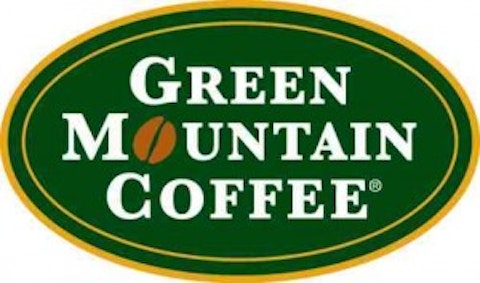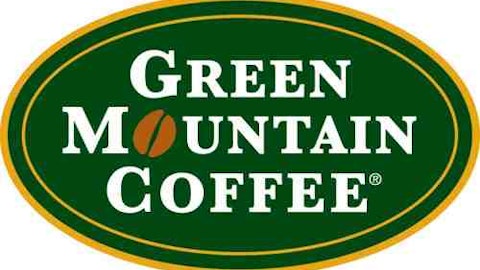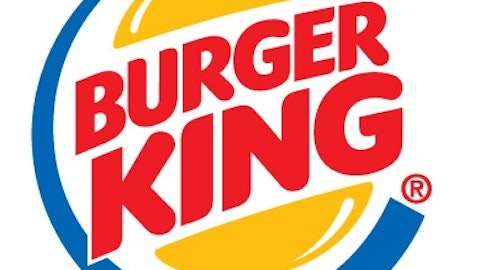Green Mountain Coffee Roasters Inc. (NASDAQ:GMCR) is a unique story. Despite revenue and earnings growth, a strong balance sheet, and an effective strategy, the short position is north of 37%. Therefore a lot of investors/traders believe a gap down is on the horizon.
Misconception
The shorts are all over Green Mountain Coffee Roasters Inc. (NASDAQ:GMCR) for two reasons. One is that if a licensing deal is terminated with, let’s say, a Starbucks Corporation (NASDAQ:SBUX) or Dunkin Brands Group Inc (NASDAQ:DNKN)‘s Dunkin’ Donuts, it could bring significant pain for Green Mountain Coffee Roasters Inc. (NASDAQ:GMCR)’s business. Though not ideal, it wouldn’t be as big of a problem as people think. Green Mountain Coffee Roasters Inc. (NASDAQ:GMCR) has licensing agreements with over 20 big-name companies, and this list is expected to grow. Currently, these names include the aforementioned Starbucks Corporation (NASDAQ:SBUX) and Dunkin’ Donuts, Caribou Coffee, Snapple, Swiss Miss, and Wolfgang Puck.
This diversification should lead to downside protection. While this is true in the real world, it’s not necessarily the case for the stock, since perception trumps fundamentals in the short to medium term. The shorts might have the potential to make some money in the short term. However, betting against a growing company with strong fundamentals isn’t recommended. There are much better short options out there.
Investor safety
Green Mountain Coffee Roasters Inc. (NASDAQ:GMCR)’s valuation is also luring in short-sellers. Green Mountain trades at 29 times earnings. This might be a steep price, but Starbucks Corporation (NASDAQ:SBUX) and Dunkin Brands Group Inc (NASDAQ:DNKN) trade at 34 times earnings and 36 times earnings, respectively.
If you’re looking for a better investment option than Green Mountain Coffee Roasters Inc. (NASDAQ:GMCR), then you can argue that Starbucks Corporation (NASDAQ:SBUX), with a market cap of $53.68 billion, is a much safer play than Green Mountain, with a market cap of $12.74 billion. Its larger size makes Starbucks Corporation (NASDAQ:SBUX) more resilient to broader market corrections because it’s a bigger ship to turn. Starbucks Corporation (NASDAQ:SBUX) also yields 1.20%, which helps ease any potential pain. Green Mountain doesn’t offer a yield.
If you look at the chart below, you’ll see Green Mountain has outperformed Starbucks over the past five years. On the other hand, its stock is much more volatile, and not for the faint of heart. Meanwhile, Starbucks has seen a steady ascent over this time frame:
Dunkin’ Brands is smaller than Green Mountain, sporting a market cap of $4.53 billion. We don’t know much about how Dunkin’ Brands would perform in a bear market, because it hasn’t been public long enough. The short position on Dunkin’ Brands is also relatively high — just shy of 8%. However, Dunkin’ Brands has a debt-to-equity ratio of 5.13, versus just 0.13 for Green Mountain. Therefore, if difficult times are ahead, Green Mountain should have an easier time navigating its way through such an environment. Interest on debt won’t impede Green Mountain’s growth potential.
Industry trends
Today’s consumer wants coffee convenience without sacrificing quality. This is where Green Mountain comes in. With its Keurig Single Cup Brewing systems and single-serve packs, you can now enjoy high-quality coffee in your home, office, as well as many other locations. Better still, all you have to do is push a button. There’s no mess to clean up, and consumers don’t have to pay a lot for this convenience. Green Mountain often sells its brewing systems at cost, or at a loss, and focuses on its single-serve packs for profit. This strategy has worked out well thus far, and it doesn’t look in danger of a slowdown.
In the third quarter, Green Mountain’s net sales jumped 11% year over year, driven by an 18% increase in single-serve pack net sales. The U.S. has been outperforming Canada, but Canada’s recent weakness was due to brewery and accessory revenue declines, not a fading demand in single-serve packs, which is the key to the business.
Looking ahead, Green Mountain expects full-year EPS growth of 13%-14%, and revenue growth of 37%-39%. Over the long haul, revenue won’t grow at that pace, but Green Mountain expects it to remain in the double digits for the foreseeable future.
In addition to Green Mountain seeing continued growth in a difficult economic environment, it should be noted that there’s been some recent insider buying. This almost always leads to improved stock performance. However, that’s not the case if the broader market falters, and that’s the biggest current risk for Green Mountain. If the market heads south, investors and traders will run away from growth stocks and into large-cap defensive names.
The bottom line
I have written bullishly on Green Mountain for more than six months. I have no position on the stock. I simply see a company that offers what consumers want, as well as a company that continues to grow through partnerships, innovation, and expansion. Despite all of these positives, the majority of the stock’s current bull run is most likely complete. This has nothing to do with the company itself, which is well run, but the effects that a broader market correction might have on the stock price. If Green Mountain’s stock price suffered, I would strongly consider initiating a position. If you want more safety without sacrificing growth potential, Starbucks might be a better option for you.
The article This Specialty Coffee Company Is a Winner, but Risks Exist originally appeared on Fool.com and is written by Dan Moskowitz.
Dan Moskowitz has no position in any stocks mentioned. The Motley Fool recommends Green Mountain Coffee Roasters and Starbucks. The Motley Fool owns shares of Starbucks.
Copyright © 1995 – 2013 The Motley Fool, LLC. All rights reserved. The Motley Fool has a disclosure policy.





